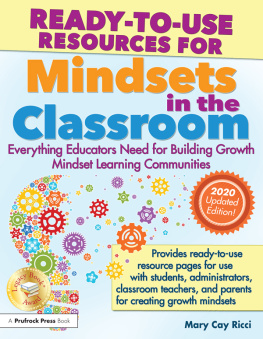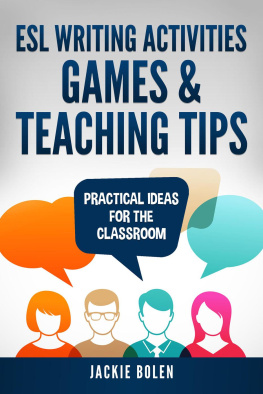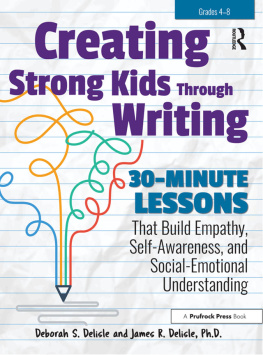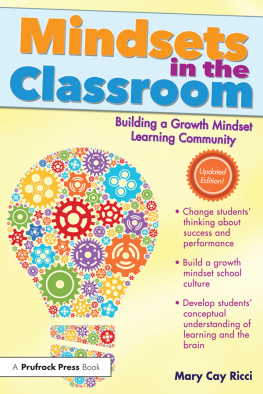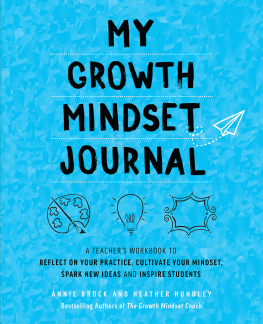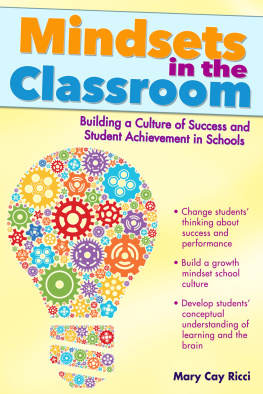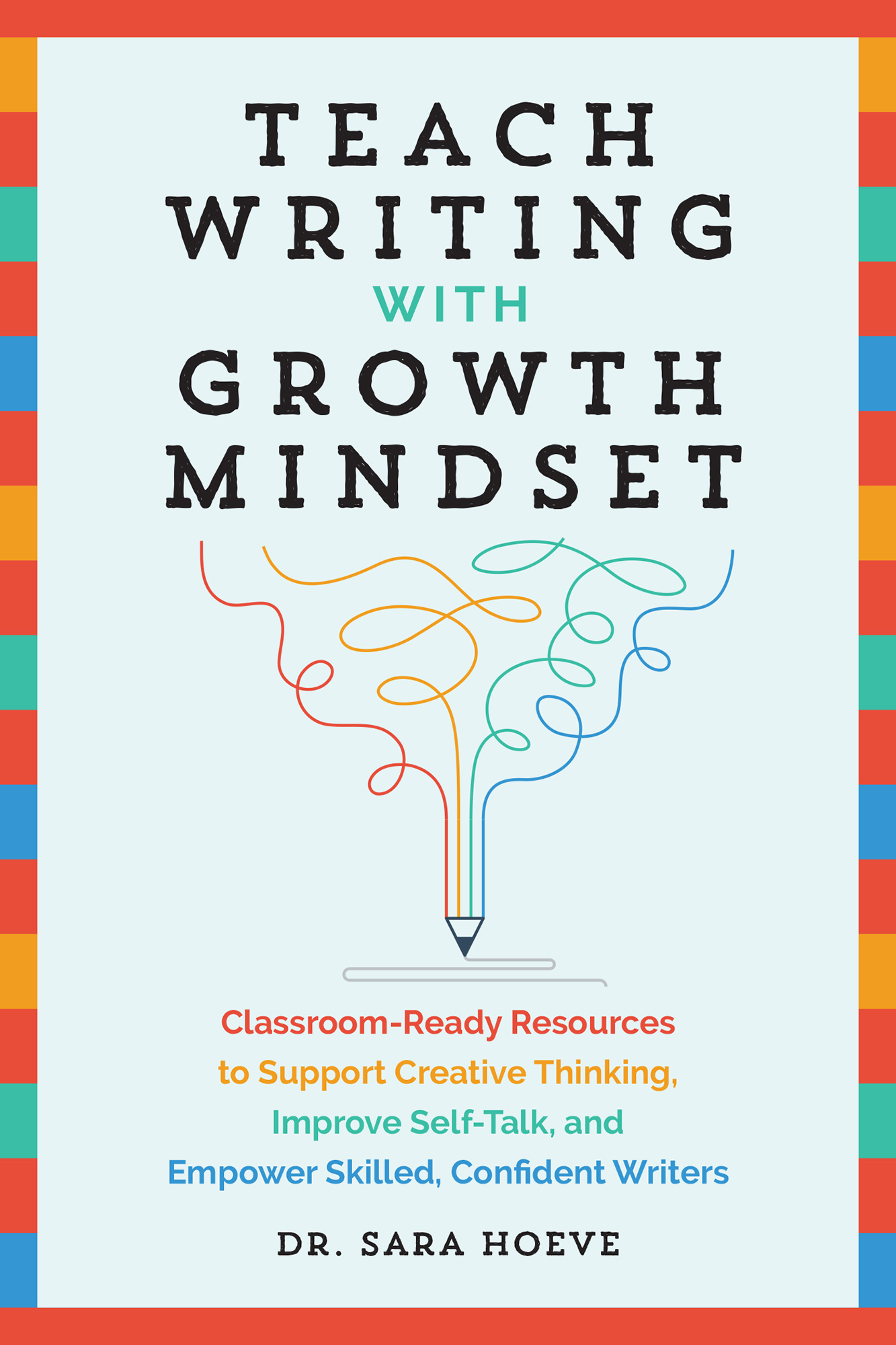Contents
Guide
Teach Writing with Growth Mindset
Classroom-Ready Resources to Support Creative Thinking, Improve Self-Talk, and Empower Skilled, Confident Writers
Dr. Sara Hoeve
Text copyright 2022 Sara Hoeve. Design and concept copyright 2022 Ulysses Press and its licensors. All rights reserved. Any unauthorized duplication in whole or in part or dissemination of this edition by any means (including but not limited to photocopying, electronic devices, digital versions, and the internet) will be prosecuted to the fullest extent of the law.
Published by:
ULYSSES PRESS
PO Box 3440
Berkeley, CA 94703
www.ulyssespress.com
ISBN: 978-1-64604-313-2
ISBN-13: 978-1-6460-4339-2 (eBook)
Library of Congress Control Number: 2021947095
Acquisitions editor: Casie Vogel
Managing editor: Claire Chun
Project editor: Renee Rutledge
Proofreader: Beret Olsen
Front cover design: Amy King
Cover art: stmool/AdobeStock
Interior design: what!design @ whatweb.com
Layout: Jake Flaherty
Production assistant: Yesenia Garcia-Lopez
NOTE TO READERS: This book is independently authored and published. No endorsement or sponsorship by, or affiliation with, copyright and trademark holders is claimed or suggested. All references in this book to copyrighted or trademarked products are for the purpose of commentary, criticism, analysis, and literary discussion only.
This book is dedicated to my father, Paul Erffmeyeran incredible teacher and mentor who has always believed in my potential for growth.
FOREWORD
Dear Reader,
As a former English teacher, I have witnessed firsthand the paralytic effect that a blank screen can have on an emerging writer. Absent the belief in your ability to create something uniquely informative, beautiful, powerful, or truthful through writing, that blinking cursor can feel like its taunting you: You cant write! Your ideas are terrible! Youre going to look stupid! But heres the thing: becoming a great writer is just like becoming great at anything elseit takes a lot of hard work, perseverance through failure, and, of course, the right mindset.
Mindset is a simple concept with powerful consequences. Boiled down to its essential meaning, growth mindset, on one end of the mindset spectrum, is the belief in your ability to improve through effort and perseverance. On the other end of the spectrum, fixed mindset is the belief that your abilities are fixedthat you were born with natural talent in a particular area or you werent, and theres not much you can do to change that. And the way you approach a challenge or situation, whether with an open-minded willingness to grow or a close-minded belief that success is impossible, will lead to an outcome that reflects that mindset. To borrow Henry Fords famous words, Whether you think you can or think you cantyoure probably right.
Thats it. Thats the crux of mindset. After studying mindset in the classroom for six years and publishing five books on the topic, I realized that fixed-mindset beliefs account for many solvable problems in education. From school policies that underestimate students with learning challenges and limit access to advanced classes to students who resist a new opportunity, these damaging beliefs can topple dreams and level aspirations before they even have a chance to fully form.
Few subjects bring out students fixed mindsets more than writing. Many students enter the language arts classroom believing that great writers are born, not made. That erroneous belief can prevent students from even attempting to hone their writing skills. This apathybolstered by the misguided notion that no matter how hard they try, they will never be any goodleaves students asking themselves, Why bother trying at all?
Students often spend their formative years laboring under the assumption that completing the first draft means the finish line is near and then feeling defeat and confusion when receiving critical feedback. Most people fail to understand that the first draft in writing is just the beginning of the process. Just as Michelangelo sculpted David from a block of marble, the writers first draft is their metaphorical block of marble, waiting for the beauty within to be revealed through careful sculpting.
It would be nice if we could just reach into our students brains and flip the growth mindset switch to the on position when its time to write. If only we could make them believe that it is not a special God-given gift that makes a superb writer but the willingness to see a piece of writing through each stage of a complex process. Unfortunately, no such switch exists. The individual student, not the teacher, determines mindset when approaching a new challenge. So, whats a teacher to do?
Dr. Sara Hoeve answers this question in the following pages by reimagining the traditional writing process and the writing classroom. Instead of the finished draft being the goal, Dr. Hoeves strategies focus on the process of writing in a growth-oriented environment. Her growth-mindset strategies for teaching writing shine a spotlight on feedback, editing, and rewritingwhich, every accomplished writer knows, is where the magic happens. Focusing on encouraging iteration, delivering meaningful feedback, and developing a growth-oriented classroom culture, Dr. Hoeve outlines a process for getting your students to engage with writing like never before.
Once your students realize that writing is a process anyone can learn and the classroom is a safe space in which to explore that process without fear of judgment, beliefs about writing begin to shift. Together, you will eschew the rampant misconception that the first draft reflects the best ability and deepen your understanding of what it means to be a writer. Being a great writer isnt about being bestowed with some ineffable gift. Rather, it is a gradual building of skill. It is taking away and adding and changing and rewording until something extraordinary begins to emerge. It is the understanding that all polished masterpieces once began as rough drafts.
In our information-driven world, writing well is not a nice-to-have skill, its a need-to-have skill. Every student should leave high school with the ability to express themselves clearly and confidently in writing. That begins by dismantling the fallacy that only a few chosen people can do it well. This book will help you create the conditions and implement the strategies necessary to help your students shed the false limitations of the fixed mindset and relish in the triumphs and opportunities of growing into skilled writers.
Annie Brock
Coauthor of The Growth Mindset Coach
INTRODUCTION
WHAT TO EXPECT FROM THIS RESOURCE
Teach Writing with Growth Mindset begins with a review of mindsets, examining Stanford psychologist Carol Dwecks research on the topic and its impact on the field of education. After revisiting mindset beliefs about intelligence, we will consider how teachers and researchers have applied the concept of mindsets to examine the beliefs and behaviors common to different student populations and disciplines.


